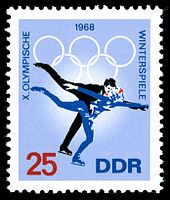Cold War
The Winter Olympics have been an ideological front in the Cold War since the Soviet Union first participated at the 1956 Winter Games. It did not take long for the Cold War combatants to discover what a powerful propaganda tool the Olympic Games could be. Soviet and American politicians used the Olympics as an opportunity to prove the perceived superiority of their respective political systems.[113] The successful Soviet athlete was feted and honoured. Irina Rodnina, three-time Olympic gold medallist in figure skating, was awarded the Order of Lenin after her victory at the 1976 Winter Olympics in Innsbruck.[114] Soviet athletes who won gold medals could expect to receive between $4,000 and $8,000 depending on the prestige of the sport. A world record was worth an additional $1,500.[115] In 1978 the United States Congress responded to these measures by passing legislation that reorganised the United States Olympic Committee. It also approved financial rewards to medal-winning athletes.[116] The Cold War created tensions amongst countries allied to the two superpowers. The strained relationship between East and West Germany created a difficult political situation for the IOC. Because of its role in World War II, Germany was not allowed to compete at the 1948 Winter Olympics.[20] In 1950 the IOC recognised the West German Olympic Committee,[117] and invited East and West Germany to compete as a unified team at the 1952 Winter Games. East Germany declined the invitation and instead sought international legitimacy separate from West Germany.[118] In 1955 the Soviet Union recognised East Germany as a sovereign state, thereby giving more credibility to East Germany's campaign to become an independent participant at the Olympics. The IOC agreed to provisionally accept the East German National Olympic Committee with the condition that East and West Germans compe

e on one team.[119] The situation became tenuous when the Berlin Wall was constructed in 1962 and western nations began refusing visas to East German athletes.[120] The uneasy compromise of a unified team held until the 1968 Grenoble Games when the IOC officially split the teams and threatened to reject the host-city bids of any country that refused entry visas to East German athletes.[121] [edit]Boycott The Winter Games have had only one national team boycott when Taiwan decided not to participate in the 1980 Winter Olympics held in Lake Placid. Prior to the Games the IOC agreed to allow China to compete in the Olympics for the first time since 1952. China was given permission to compete as the "People's Republic of China" (PRC) and to use the PRC flag and anthem. Until 1980 the island of Taiwan had been competing under the name "Republic of China" (ROC) and had been using the ROC flag and anthem.[43] The IOC attempted to have the countries compete together but when this proved to be unacceptable the IOC demanded that Taiwan cease to call itself the "Republic of China".[122][123] The IOC renamed the island "Chinese Taipei" and demanded that it adopt a different flag and national anthem; stipulations that Taiwan would not agree to. Despite numerous appeals and court hearings the IOC's decision stood. When the Taiwanese athletes arrived at the Olympic village with their Republic of China identification cards they were not admitted. They subsequently left the Olympics in protest, just before the opening ceremonies.[43] Taiwan returned to Olympic competition at the 1984 Winter Games in Sarajevo as Chinese Taipei. The country agreed to compete under a flag bearing the emblem of their National Olympic Committee and to play the anthem of their National Olympic Committee should one of their athletes win a gold medal. The agreement remains in place to this day.